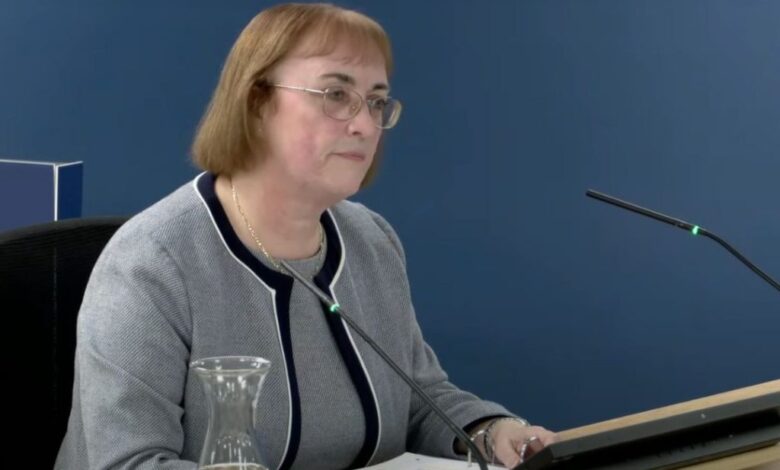Pandemic nurse ratio dilution added to staff stress in Wales

The diluting of nurse ratios in critical care added to the stress on staff during the pandemic, the former chief nursing officer (CNO) for Wales has acknowledged.
Professor Jean White, who was the Welsh CNO from October 2010 until her retirement in April 2021, gave evidence to the UK Covid-19 Inquiry yesterday.
“We recognised that the critical care nurses would be under tremendous pressure”
Jean White
She confirmed that in critical care units in Wales, the usual 1:1 patient-to-nurse ratio needed to be broken during the pandemic, like it was in other UK countries.
However, while in England the ratio was pushed to 1:6, Professor White said in Wales, this was determined to be too “extreme”.
The decisions about critical care nursing ratios in Wales were made collaboratively between the Welsh critical care network, herself and others in the Welsh Government, she explained.
As patient demand for critical care was rapidly increasing, Professor White said “national guidance” had come in about diluting nurse ratios which was then considered in Wales.
“The critical care network were the ones that had on-the-ground experience about what would work in practice, and they then challenged back,” said Professor White.
“And the original guidance around dilution was quite extreme, to be honest, it was something like one up to six.
“And they were saying ‘Whoa, that is just… that’s much too far’.”
In Wales, it was agreed that nursing ratios would be diluted to 1:2, or 1:3 in “extraordinary circumstances”.
The move came as critical care units in Wales were required to double their capacity in order to meet demand during the early days of the pandemic.
Asked if the staffing dilution impacted patient care, Professor White said: “I would say it added to the stress on the staff.”
She said, like other parts of the UK, a new team-based approach was introduced in Wales to support the critical care nurses.
For example, “turning teams” were rolled out to prone patients – a process that takes around six people to do.
In addition, she said new national mental health resources were rolled out for staff to supplement employer-level support.
“So, we recognised that the critical care nurses would be under tremendous pressure so we tried to bring in things that would support that,” said Professor White.
“But to be honest, I suppose if you’re looking after twice the number of patients it’s going to be difficult.”
An email was shared during the inquiry that Professor White received from a Welsh Government official in relation to the nursing ratio changes.
The email, from January 2021, stated that 11 of the 13 intensive care units in Wales were on the “stretched” 1:2 ratios and many were still finding staffing difficult.
“Redeployed staff have been moved to critical care to help out these units,” it read.
“However, given the whole hospital strain and vast number of patients in critical care, redeployment hasn’t actually been 100% enough for all critical care patients/units in Wales.”
The email further cited “uncertainty around the impact of this on the quality of care and ultimately to the outcomes of the patient”.
Asked about this during the inquiry, Professor White said this period of the pandemic – the second wave – was “very tough”.
This was in part because other areas of the hospitals were re-opening so competition for staff was higher, she explained.
“During the second wave, to a degree, I suppose it was worse than the first wave because a lot of staff were needed, because we were starting to re-open other bits of the hospitals, so there weren’t the availability of staff to redeploy,” she said.
The critical care network advised that a 1:3 ratio would be unsafe at this point because “there aren’t the supplementary staff to support them”, said Professor White.
Professor White’s appearance at the Covid inquiry came after her England equivalent, Dame Ruth May, gave her evidence.
During her sitting, Dame Ruth said the decision to allow critical care nursing ratios to be diluted to 1:6 in the first wave of the pandemic would “stay with me forever”.
After hearing about the impact on staff and gaining personal experience working in intensive care, Dame Ruth made sure ratios were improved to 1:2 in the second wave, she told the inquiry.
To read what else Professor White and the other UK CNOs told the Covid inquiry, see Nursing Times’ live coverage.
More from the UK Covid-19 Inquiry







